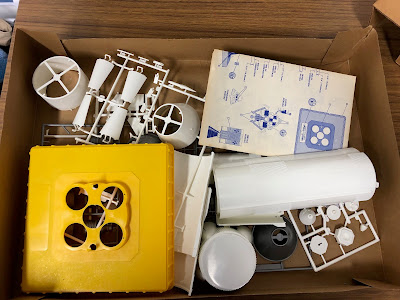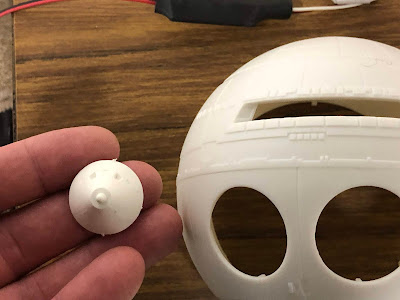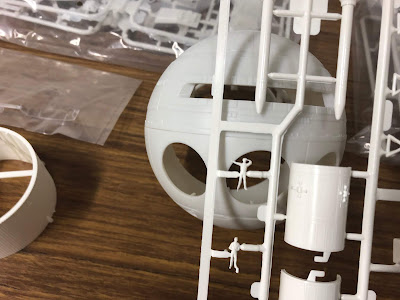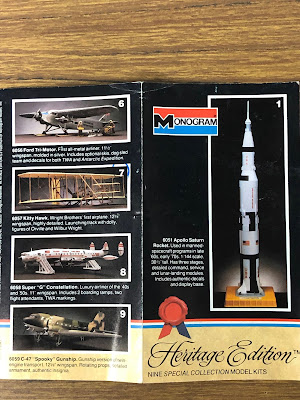The theme of this week is the Apollo 11 50th anniversary of the moon landing. So breaking from my current builds, I'm reviewing an old model kit, the Apollo Saturn V Rocket by Monogram Models, now a part of Hobbico.
I've seen a number of Saturn V kits releases over the years, but this one has always had a special place in my heart as the I built 2 of them as a kid (one poorly made by my 8 year old self, the other early teens). I've seen other versions of the Saturn V but none that I know of have the the one feature which is special to this kit, how the 3rd stage which houses the LEM (Lunar Excursion Module) opens up like a banana peel. Most kits make it a solid piece which removable. Meh...even if the hinge mechanism isn't accurate, the function is.
What's interesting about this kit, it is an anniversary edition, 15th anniversary edition. I was talking about this to one of people who works at the local hobby shop I go to, just talking about the 50th anniversary of the moon landing and apparently the hottest kit in his store is again a repop of the LEM, again released originally prior to Apollo 11. Also, the paint scheme suggested here is not of the Saturn V rockets that went to the moon, but an alternative pattern in the stage I booster.
 |
| From Wikipedia |
The paint instructions, or lack thereof for the LEM are sooo wrong...
 |
| (banana peel) |
 |
| I was a little younger than that when I built my 1st Saturn V. In the 80s, model builders were often shown as kids or retirees, or both. A very common misconception. |
WHAT'S INSIDE THE BOX?
When I opened up the box for the first time reveals how models were packed often back then, quite loose. Since it's a vintage model, there's a good chance this was resealed.
Here are all the parts laid out on the floor. It was molded in 3 colours: white, a metallic grey and a yellow stand? I believe later versions made the stand grey to match the base of the launch tower.
There are 26 metallic grey parts, 60 white parts and one yellow base. 87 parts, not a bad part count for a model of this era.
The decals are old and are in pretty rough shape. I will order aftermarket decals when I build my kit.
I love the old blue print here. Back when this kit was produced, there weren't laser printers but you would go to a print shop to have things done in mass quantities. Back in 1983, colour photocopiers didn't exactly exist, or at least not for the general public.
The instructions are well detailed as are the callouts on it. No complaints here.
A little 1/144 scale comparisons...
Everything at 1/144 scale is a pretty easy conversion, 1 inch equals 12 feet. This scale is often used in airplanes as you can see a human scale quite easily. I have two other models, both unbuilt at this scale: Lando's Millennium Falcon from Solo: A Star Wars Story, and Discovery XD-1 from 2001: A Space Odyssey.
I will say it's interesting to see the command module of both the Falcon and the Apollo capsule in comparison. Very close in size.
Same with the LEM.
These guys are almost the same diameter!!
This is what the command module would look like if mounted in place of the Falcon's cockpit...
Now for Discovery...Discovery's command module is gigantic in comparison!
The LEM upper stage is almost the same size as an EVA Pod from Discovery.
And a little human comparison.
And now for a vintage brochure...
According to the box art, this model kit is one of nine in a series of 'Heritage' model kits.
The remaining kits are listed below, all from various points of Americana. I must say, the missile collection is an odd one in my opinion but to each their own.
This model kit, isn't the most detailed, like modern kits such as those made by Bandai or Moebius, or the recent new kits through Round 2, but this does make for a great model and representation of the Saturn V rocket, especially how it separates into individual parts. You can remove all of the parts the way how the actual rocket operated, including the escape tower at the top, which covers the command module, which some models seems to omit. The command module was covered with shiny foil exterior, which burned up when it splashed down. The escape tower had a white covering over the command module.
I do look forward to building this model one day. I've seen a few builds that are truly amazing! There are accurizing kits available through the garage market, not to mentioned masks and upgraded decals. This is a standard for me for almost every model I do now. It raises the price per build but makes an ordinary kit extra-ordinary.
This concludes this retro review, in honour of the men and women who turned the race to the moon from a dream into reality.
Peace.





























